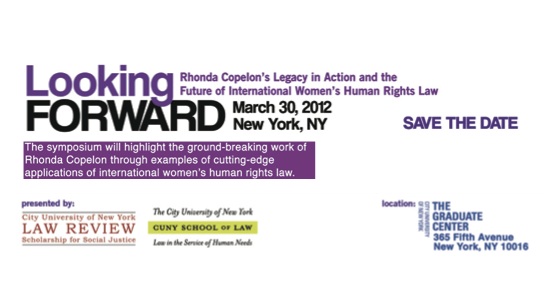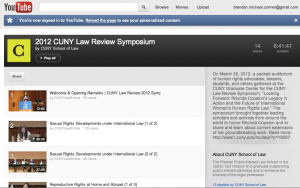 On March 30, 2012, a packed auditorium of human rights advocates, lawyers, students, and others gathered at the CUNY Graduate Center for the CUNY Law Review Symposium, “Looking Forward: Rhonda Copelon’s Legacy in Action and the Future of International Women’s Human Rights Law.” The symposium brought together leading scholars and activists from around the world to honor Rhonda Copelon and to share and learn about current extensions of her groundbreaking work.
On March 30, 2012, a packed auditorium of human rights advocates, lawyers, students, and others gathered at the CUNY Graduate Center for the CUNY Law Review Symposium, “Looking Forward: Rhonda Copelon’s Legacy in Action and the Future of International Women’s Human Rights Law.” The symposium brought together leading scholars and activists from around the world to honor Rhonda Copelon and to share and learn about current extensions of her groundbreaking work.
 The day-long event looked at how Copelon’s work helped to define and shape the field of international women’s human rights and described how her vision continues to influence and inspire advocates and practitioners. The panels focused on areas of work where Copelon made a significant impact: sexual rights developments under international law, reproductive rights at home and abroad, rape as a form of torture, and domestic implementation of international human rights law. Panelists and speakers discussed how Copelon influenced them personally and professionally and reflected on how her vision, tenacity, and commitment to gender justice help to shape their responses to the challenges they face today. As the speakers described their approach to building human rights protections for gender rights, they invoked Copelon’s lesson that the role of advocates is not to argue what the law is, but rather what the law should be.
The day-long event looked at how Copelon’s work helped to define and shape the field of international women’s human rights and described how her vision continues to influence and inspire advocates and practitioners. The panels focused on areas of work where Copelon made a significant impact: sexual rights developments under international law, reproductive rights at home and abroad, rape as a form of torture, and domestic implementation of international human rights law. Panelists and speakers discussed how Copelon influenced them personally and professionally and reflected on how her vision, tenacity, and commitment to gender justice help to shape their responses to the challenges they face today. As the speakers described their approach to building human rights protections for gender rights, they invoked Copelon’s lesson that the role of advocates is not to argue what the law is, but rather what the law should be.
Watch the full day of panels on YouTube, or as a free download from iTunes U.
The speakers and panelists included:
- Catherine Albisa, Executive Director, National Economic and Social Rights Initiative
- Michelle J. Anderson, Dean, CUNY School of Law
- Caroline Bettinger-Lopez, Professor of Law and Director, Human Rights Clinic, University of Miami School of Law
- Blaine Bookey, Staff Attorney, Center for Gender and Refugee Studies
- Lauren Dasse (’12), Editor-in-Chief, CUNY Law Review
- Lisa Davis (’08), Clinical Professor of Law, International Women’s Human Rights Clinic, CUNY School of Law
- Felice Gaer, Vice Chair, UN Committee Against Torture
- Scott Long, Visiting Fellow, Human Rights Program, Harvard Law School
- Joey Mogul (’97), Partner, People’s Law Office and Director, Civil Rights Clinic, DePaul University College of Law
- Marianne Mollmann, Senior Policy Advisor, Amnesty International
- Nancy Northup, President, Center for Reproductive Rights
- Andrea Ritchie, Director, Streetwise and Safe; Co-Author ofQueer (In)Justice
- Monica Roa, Director of Programs, Women’s Link Worldwide
- Sir Nigel Rodley, Member, UN Human Rights Committee and Former UN Special Rapporteur on Torture
- Celina Romany, Director, Center for Human Rights, Inter-American University of Puerto Rico School of Law
- Patricia Viseur Sellers, Former Legal Advisor for Gender-Related Crimes, Office of the Prosecutor for the International Criminal Tribunals for Rwanda and the Former Yugoslavia
- Cindy Soohoo, Professor of Law and Director, International Women’s Human Rights Clinic, CUNY School of Law
- Pam Spees (’98), Senior Staff Attorney, Center for Constitutional Rights
- Jessica Stern, Director of Programs, International Gay and Lesbian Human Rights Commission (IGLHRC)
- Yifat Susskind, Executive Director, MADRE
- Vincent Warren, Executive Director, Center for Constitutional Rights
Moderators included:
- Penelope Andrews, Associate Dean and Professor of Law, CUNY School of Law
- Caitlin Borgmann, Professor of Law, CUNY School of Law
- Julie Goldscheid, Professor of Law, CUNY School of Law
- Ruthann Robson, Distinguished Professor of Law, CUNY School of Law
The City University of New York Law Review is edited and published by the students of the City University of New York School of Law. The Law Review is dedicated to social justice legal scholarship. It aims to inform the legal community of recent developments in public interest law and to provide a forum for practitioners whose clients might otherwise lack meaningful representation in the legal system.
Copelon was a founding faculty member of CUNY School of Law, a co-founder of CUNY Law’s International Women’s Human Rights (IWHR) Clinic, a human rights attorney, and a vice-president of the Center for Constitutional Rights (CCR). She built on early pioneering work in the reproductive rights movement and broke new ground opening U.S. federal courts to international human rights violations and international tribunals to gender-based violence. She helped lay the conceptual foundation for some of today’s most influential case law in the field of women’s international human rights. She passed away in 2010 at age 65, leaving an astounding body of work.
The symposium was organized in conjunction with the IWHR Clinic and was co-sponsored by MADRE and the Center for Constitutional Rights. Volume 15.2 of the CUNY Law Review will be dedicated to the symposium and will be published in fall 2012.
